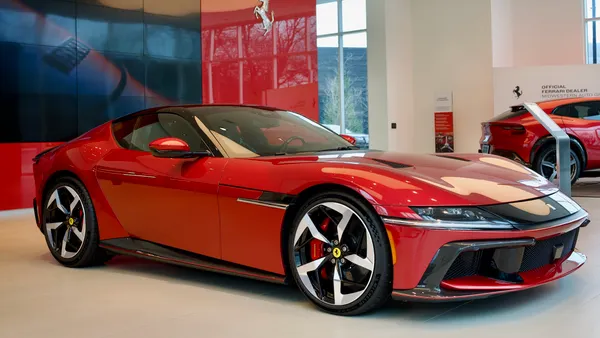Editor's note: This story is part of the WardsAuto digital archive, which may include content that was first published in print, or in different web layouts.
FRANKFURT – The Smart brand may be struggling for profitability, and its product future in North America is in question.
But don't dismiss the marque that redefined Europe's minicar segment in the late 1990s, says Ulrich Walker, president of Smart GmbH.
“We are convinced that we have chosen the right approach to put Smart on a sound and sustainable economic footing,” Walker tells the media at the auto show here.
The DaimlerChrysler AG board of management, apparently losing patience with the steady flow of red ink at the Smart business unit of the Mercedes Car Group, announced in March a new “business model” designed to help the operation at least break even in 2007.
Smart Crosstown hybrid concept is derived from Fortwo city car.
The plan includes stepped up development of the successor to the Smart Fortwo city car, including meeting safety and size requirements for the U.S. market. The belt-tightening also includes terminating the Smart roadster program by the end of the year and discontinuing the Smart SUV project. (See related story: DC Revamps Smart Business Plan)
Walker says Smart is well on its way to meeting its financial goals, and that the business unit has reduced fixed costs 26% and has identified additional cost savings.
“We have further increased our efficiency,” Walker says. “Today, I can assure you that we will reach our operating result target for 2005. Smart is on the right track toward an economically sound future.”
Smart also has added 195 sales and service outlets in Europe, making it more “accessible” to small-car buyers, Walker says.
Smart has grown sales in a segment that has been in decline overall.
In the year's first eight months, Smart says it posted an 11% increase in worldwide deliveries, to 93,400 units, led by the Fortwo.
DaimlerChrysler says the Forfour 4-door hatchback, January through August, also increased its share of the stagnating small-car market. In Germany, for example, the 4-seater gained two percentage points of market share, the company says.
Still, doubts about the viability of Smart have spread across Europe, and the business unit confronted those concerns head-on with an unusual presentation here at the Frankfurt show.
Before giving his speech, Walker was interviewed on stage by Susanne Kronzucker, a political journalist for German-based RTL Television. In front of a massive crowd, Walker answered a series of tough questions that have been on the minds of many Europeans.
Among them: “How will you get hold of your business?” and “How will you make this new business model work long-term?” Walker says Smart will navigate through its difficulties by remaining focused on innovative products that excite consumers.
Smart entered the Canadian market in October with the turbodiesel Fortwo, and sales have exceeded expectations. The company says it sold 1,000 Smart cars in Canada in 2004 and has dellivered 2,600 so far this year.
Plans to enter the U.S. market remain uncertain, but Walker says Smart is seeking regulatory approvals to sell the next-generation Fortwo in the U.S. That model is expected to launch in fall 2007, the auto maker says.
“We can ship 20,000 models to the U.S. if necessary,” Walker says. “But we will only go to the U.S. if the business model is profitable.” He says a decision will be made near the end of the year.
Skyrocketing gasoline prices in the U.S. may be the best thing to happen to Smart's global marketing vision, prompting SUV drivers to at least consider a more modest, if revolutionary, means of transportation.
The Fortwo may be a cute, quirky dollop of a car, but the product remains Smart's top-seller after seven years in the market.
Most Americans may find the Fortwo too small and vulnerable for U.S. roads, but Smart executives are convinced there is a need for such a city car.
Studies have found that on average a car carries only 1.2 people, Smart says.
Smart may see some new competition in its city-car segment. At Frankfurt, Toyota Motor Corp. is displaying its innovative Endo 2-door, 4-seat concept, which bears a striking resemblance to a Smart car.
Toyota appears to be serious about producing the inexpensive compact Endo, which has the same wheelbase as the Toyota Aygo, one of three low-cost minicars it is building in a joint venture with PSA Peugeot Citroen in Kolin, Czech Republic. (See related story: PSA High On Minicar Market; Launches Revised 307)
Also at Frankfurt, Smart unveils its Crosstown 2-door convertible hybrid-electric vehicle concept.








